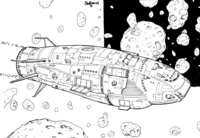Sylvester (WarShip class)
- This article is about the WarShip. For other uses, see Sylvester.

| |
| Sylvester | |
| Production information | |
| Manufacturer | Ioto Galactic Enterprises[1] |
| Introduced | 2499 |
| Production Year | 2499[2] |
| Use | Transport |
| Tech Base | Inner Sphere |
| Cost | 3,188,057,500 C-Bills[citation needed] |
| Technical specifications | |
| Mass | 280,000 tons |
| Length | 905 meters |
| Sail Diameter | 1,200 meters |
| Fuel | 2,000 tons |
| Burn Rate | 39.52 |
| Safe Thrust | 1.5 g |
| Top Thrust | 2.5 g |
| Sail Integrity | 3 |
| KF Drive Integrity | 7 |
| LF Battery | No |
| Armament |
|
| Armor | 104 tons standard |
| DropShip Capacity | 2 |
| Crew | 202[1]
Marines: 60 |
| Grav Decks | 2 x 98 meters diameter |
| Escape Pods/Life Boats | 10/10 |
| Heat Sinks | 767 double |
| Structural Integrity | 20 |
| BV (1.0) | 25,603[1] |
| BV (2.0) | 19,627[citation needed] |
Contents
Description[edit]
The first WarShip designed by civilians, the Sylvester-class transport was the brainchild of merchant-noble Graf Hans Sylvester of the Lyran Commonwealth. Introduced during the Age of War, the Sylvester was the most heavily armed civilian vessel ever to launch. The Sylvester was designed with two goals in mind: the Sylvester was a well-armed convoy transport vessel that could hold its own against pirate attacks, but the Sylvester was also meant to intimidate the mercantile interests of neighboring realms.[1]
Though expensive, the Sylvester was acquired by a Lyran trade committee in 2496. Just three years later in 2499, the Ioto Galactic Enterprises shipyard on Alarion finished production on the first of the class. However, only three more Sylvester-class vessels would ever slip their moorings between 2499 and 2514. Ultimately, the price tag of the Sylvester sealed its fate.[1]
Armament[edit]
The Sylvester was very well-armed for a civilian vessel; in fact, the Sylvester was the best-armed vessel ever constructed by corporate interests. The Sylvester's armament combines a very strong point-defense (including lasers, autocannons, and machine guns) with capital-scale slugging power, perfect for fending off combat Dropships and light WarShips.[1]
The second-largest drawback to the Sylvester is its poor armor protection. The Sylvester coukd not stand up to a well-armed opponent. However, the Sylvester was maneuverable enough to evade some conflicts, and despite the poor protection, the Sylvester was unlikely to encounter an adversary it simply cannot deter through firepower.[1]
Cargo[edit]
Above all, the Sylvester was a transport ship. The vessel can ferry 2 DropShips and has the capacity for 4 small craft. The Sylvester also had a larger cargo capacity than any other contemporary JumpShip with 3 bays. 45 rooms for accommodating paying passengers augmented the vessel's capacity and increased its profit margins.[1]
- Bay 1: Small Craft (2), 2 doors
- Bay 2: Small Craft (2), 2 doors
- Bay 3: Cargo (24,452.5 ton), 3 doors
- Bay 4: Cargo (24,452.5 ton), 3 doors
- Bay 5: Cargo (24,452.5 ton), 3 doors
Related WarShips[edit]
- Carrack - Though too expensive to become a staple of any merchant fleet, the Terran Hegemony took interest in the Sylvester and began production of its own transport, the Carrack.
Related DropShips[edit]
Still requiring an armed escort for merchant fleets, Graf Hans Sylvester had a cheaper combat DropShip designed just after the cancellation of the Sylvester WarShip. The new DropShip-sized Sylvester was referred to as a "Baby Sylvester", produced at Bolson Shipyards, New Kyoto, until a Free Worlds League Military raid destroyed the yards in 2787.[3][4][5]
Gallery[edit]
Original Sylvester from TRO:3057 Revised
References[edit]
- ↑ 1.0 1.1 1.2 1.3 1.4 1.5 1.6 1.7 Technical Readout: 3057 Revised, pp. 196–197: "Sylvester WarShip Profile"
- ↑ MUL online date for the Sylvester (WarShip class)
- ↑ First Succession War, p. 114: "Timeline of the First Succession War"
- ↑ First Succession War, p. 66: "The Vacuum War"
- ↑ House Steiner (The Lyran Commonwealth), p. 46: "The Bolson Shipyards"



